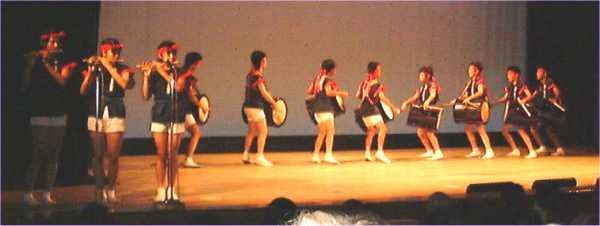- 瀬戸子供太鼓’こまいぬ座’のドイツ公演(8月12日〜17日)への壮行会を兼ね、2000年
8月6日瀬戸市民会館ホールで特別演奏会が開催されましたので、その一部撮影写真
を紹介します。
1996年にはフランスへ、1998年にはイギリス、ポルトガルへ海外公演に出かけており、
今回は3度目である。
演奏曲目は
Aこまいぬばやし: オープニングの演奏
B瀬戸川太鼓:瀬戸の1300年の歴史を物語り風に綴った4部構成
(藤四郎・瀬戸山離散・登り窯・祭り)
C海上の森: 2005年万博の地である’海上の森’を和太鼓中心のシンフォニー
(symphony)にしてある
D勇み駒: 太鼓を持ったり、鳴子を持って子供が踊る
こまいぬ座の由来: 狛犬(こまいぬ)は日本の神社に飾る魔除の犬の像であり、
瀬戸市の深川神社には陶祖である加藤藤四郎が作ったといわれる国の重要文化財
の狛犬がる。
*参照:特別演奏会パンフレット
- Special concert
was held at Seto Citizen Hall on Aug.3, 2000,
conbining the send-off
party for public performance in Germany (Aug.12through
17, 2000) by'Komainu-Za'.
These photos show some of the scenes. Public
performance in foreign countrires by
Komainu-Za is 3rd time, following
the one in France (year of 1996) and United
Kingdom
/Portugal(1998).
Programs are:
A Komainu festival music: Opening
performance
B Seto river drum: Consisting of
story-telling-like 4 scenes
(Toshirou/Seto village dispersion/Clibming
kiln/Festival)
C Forest of Kaisho: 'Kaisho' is the place
of 2005 World Exposition and is made
symphony centering around the Japanese drum.
D Inspired horse: Children dance with
drums or clappers.
* Origin of troupe 'Komainu-Za': Komainu means the statue of
dogs (pair of male
and female) who are placed in front of the
gate of Japanese Shinto shrine and
are believed to exorcise a devil. There are
national important cultural properties,
'Komainu' in Fukagawa shirine in Seto city.
The 'Komainu' is said to be made by
Mr. Toshiro Kato, founder of Seto-pottery
(called ancestor of pottery in Seto city).
|






